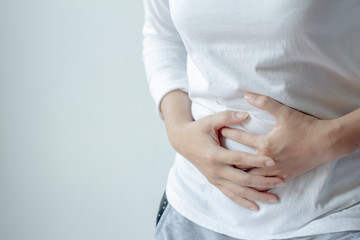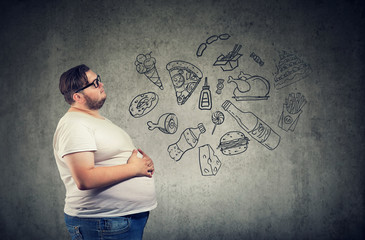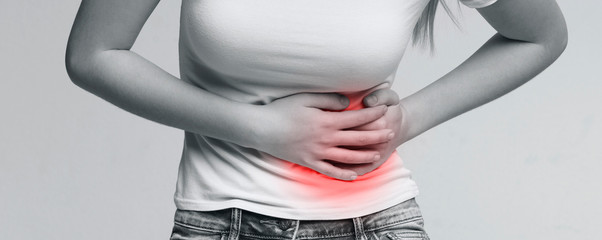One of the problems associated with an abdominal disorder may be bloating. As a rule, the body signals in this way that we are starting to get sick. The causes of bloating may also be external problems associated with improper nutrition, violation of the eating regime and diet. So this is a signal that the first signs of flatulence are appearing.

Bloating is a condition in which the stomach swells and there is a feeling of overflow and discomfort. Bloating is the feeling that the stomach is full or stretched. It occurs when the organs of the digestive system stretch. This is a condition in which the abdomen seems full and tense, most often as a result of an abundance of gases.
What are the 6 main signs of bloating?
What are the main symptoms associated with bloating?
- convulsions.
- belching.
- diarrhea.
- constipation.
- swelling.
- gases (flatulence)
What is the main cause of bloating?
The most common cause of abdominal pain and bloating is an excess of intestinal gases. If you have bloating after eating, it can become a digestive problem. It can manifest itself very simply when you eat too much and too fast, or you may have food intolerance to some foods, as well as not fresh and spicy foods. Or you have some other gastrointestinal condition that causes the accumulation of gases and digestive contents.
Am I bloated or is it gases?
Bloating usually occurs when gas accumulates in the gastrointestinal tract, as it does not escape from the body, which causes internal pressure and discomfort. You may notice that your stomach increases in size when you are bloated, which usually does not happen when you just have gas. Gases accumulate if you don't belch enough or emit gases.
How long does bloating last?
How long does bloating last immediately after eating? Bloating from time to time after eating is usually temporary and usually occurs anywhere from a couple of hours to a day or two. But how long you will feel bloated after eating may depend on the underlying cause.
What foods cause bloating?
Foods that potentially cause bloating:
- Pea.
- Beans.
- Peas.
- Lentil.
- Carbonated drinks.
- Wheat.
- Broccoli.
- Onion.
- Barley.
- Rye.
Is bloating a serious health problem?
Bloating is usually not a concern and can usually be associated simply with poor (harmful) nutrition, fast food (fast food), intolerance or intestinal problems, often on the left side. The symptoms of bloating are varied. Some people notice that their stomach starts to look swollen or deformed. Or they may experience acute abdominal or lower abdominal pain.

How to get rid of bloating?
Peppermint, ginger and chamomile have gas-extinguishing properties. Mint and ginger relax the stomach muscles, which reduces cramps and bloating. Chamomile is a common anti—inflammatory plant that helps reduce puffiness and bloating. The warmth from the tea also helps to relax the body.
Why can't I release the gases?
Gas or bloating can occur if your digestive system is unable to break down and digest certain foods such as sugar in dairy products (lactose) or proteins such as gluten in wheat and other grains. Prolonged constipation or the absence of a stool for several days can also make it difficult for gases to escape.
If you show various signs of eating disorders, such as heartburn, then you can undergo rehabilitation and wellness techniques with natural remedies at the center of the Academy of Regenerative Medicine. Contact us to consult and consider your treatment options right now here or right here.
How to stop rapid bloating?
Here are 8 great ways that can help relieve bloating.
- Take a walk. A few minutes of low-load exercise, such as walking at home and outdoors, can help your body digest and remove excess air.
- Try diaphragmatic breathing.
- Take the right pose.
- Use heat or slow, gradual heating of the body.
- Massage the middle of the torso.
- Drink hot or warm chamomile or ginger tea.
- Use relaxation of the body.
- Try peppermint oil capsules.
What foods reduce bloating?
Foods and seasonings that will help you relieve bloating:
- Avocado. These pear-shaped fruits (yes, and they are a fruit, not a vegetable) are rich in potassium.
- Bananas. Bananas contain potassium.
- Celery.
- Turmeric.
- Peppermint.
- Ginger.
- Asparagus.
- Fennel.
Why do I still feel bloated after using the toilet?
Possible causes of bloating and stretching include:
Abnormal levels of bacteria in the small intestine (small intestinal bacterial growth – SIBO).
An imbalance of microorganisms that usually live in the intestine (dysbiosis); sometimes this is the result of treatment with antibiotics.
Can water help with bloating?
An important tip for bloating is to drink plenty of water. Maintaining an adequate level of hydration is crucial if you are trying to get rid of bloating, as drinking water regularly throughout the day can prevent fluid retention caused by dehydration. Moreover, it can prevent constipation, which is a common cause of bloating.
When should I drink water to reduce bloating?
Clean drinking water can help reduce bloating by ridding the body of excess sodium. You may find that drinking water before meals can help reduce bloating, and this step can also have a double benefit: reduce the tendency to overeat.
Can skipping meals cause bloating?
Your digestive system may slow down a bit if you skip a meal, which will lead to the accumulation of gases in your stomach and intestines. Moreover, there is a high probability that if you eat after a long break, you may end up eating more. This also leads to bloating!
Is yogurt good for bloating?
Interestingly, probiotics, including the bacteria in yogurt that help with fermentation, can reduce gas and bloating. As well as kefir, snowball, curdled milk, sour cream, acidophilus, bifidoc, ryazhenka and other products based on cow's milk and its alternatives.
Does tea cause bloating?
Besides being a delicious and soothing drink, tea also has many medicinal benefits: it contains beneficial antioxidants, strengthens the immune system and can even help with bloating or indigestion — two very common diseases.
Does onion cause gases?
Onions are another common product in fast food chains that can cause gas formation. Onions contain fructan, which is difficult for the small intestine to digest. When these sugars enter the colon, they come into contact with intestinal bacteria and are fermented, causing the formation of gas as a byproduct.

Does ginger help with bloating?
Eating ginger can reduce fermentation, constipation and other causes of bloating and intestinal gases.
What is the best drink for bloating in the morning?
Answer. Lemon water.
Lemon water acts as a natural diuretic, stimulating urination and reducing water retention, which contributes to bloating. Squeeze half a lemon into a glass of warm water and drink it in the morning.
What drinks are useful for bloating at night?
Mint tea and chamomile tea are great for relieving bloating. These two herbal teas are also an excellent soothing tea that can be used to relieve sore throats or to relax at the end of the night. They can be taken together and separately without losing their benefits. The lack of caffeine content makes them a good choice at any time of the day: morning, noon or evening.
Does honey reduce bloating?
Digestive Aid: Drinking warm water with honey can stimulate the digestive system and promote the production of digestive enzymes. Honey can help relieve constipation, bloating, and other digestive problems.
How to make a homemade drink for bloating?
Take 1 liter of water, add ½ cup of diced mango and pineapple, 3-4 slices of lemon, mix everything and put in the refrigerator. This detox water is rich in beneficial antioxidants and vitamin C. Pineapple contains bromelain, an enzyme that helps digestion and relieves bloating.


